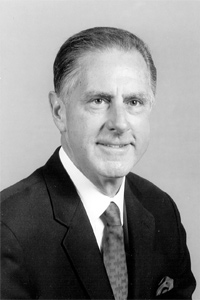A Continuing Experiment
by John Watts
 Nearly 40 years ago, I was a 30-plus-year-old banker, fresh from Navy duty, an MBA, and a bit of teaching and research-firm experience.
Nearly 40 years ago, I was a 30-plus-year-old banker, fresh from Navy duty, an MBA, and a bit of teaching and research-firm experience.
One evening Harry Knight, a recruiter and Amherst alum whom I'd met, telephoned. He suggested that I attend an event at "an experimenting college," affiliated with the other schools in the Valley, to see if I might want to help and support it: in effect be a substitute alumnus because the College was new.
Surprised, I asked why he thought I might be interested. After 10 years in military service and graduate school, I was not a prime donor prospect. Harry asserted his confidence that by meeting the founding leaders, some students, and professors, I'd become captured by the ideas behind the Hampshire venture.
I drove up; walked the campus; met students, teachers, and trustees; imagined that I might somehow be helpful to experimenting pioneers such as Ken Rosenthal, Chuck Longsworth, and Franklin Patterson; and fell in love with the whole enterprise.
Some years later, after a number of campus visits, work on a few projects, and what in West Texas we'd call "witnessing" as an advocate of Hampshire's ideas, ideals, and accomplishments, I was asked to join the board. I was honored.
Sixteen years of fun, exciting leaders and teachers, inspiring students, great discussions, some difficult board decisions, and deep friendships, and then my term as trustee came to an end. My enthusiasm continues and grows. I cherish occasional reimmersions—the recent Liebling Center dedication, for example.
I've asked myself why Harry's confident prediction was correct—that I would delight in the College—and why I believe Hampshire's teaching concepts are so important. Gradually, I realized that those concepts fit what I have absorbed about the process of learning. Based on my experience with involvement in other schools, in education ventures, during my Navy years, and from building an investment firm based on new approaches, and now investing in technologies and enterprises aimed at the CO2 challenge, I realized that I "learned by doing" something about the process of learning.
There are, it seems to me, two basic approaches to learning. Traditional education stands a teacher at the front of the room to deliver concepts and other "stuff" to relatively passive sitting customers. What is to be done with the knowledge transmitted is a detached, subsequent matter.
Another approach, typical of most human learning, is the interchange between an apprentice and more-experienced workers. It takes place without benefit of schools, principals, or provosts. It goes on continually, on the construction site, in the operating room, among young and older hunters tracking game for dinner, in the courtroom between litigators and their associates and the judges and their clerks.
However, learning by doing, as we all know, has its limitations. Many limbs lost on offshore drilling rigs, or enterprises sunk by negligent boards or executives, illustrate the dangers of over reliance on on-the-job training.
Hampshire seems to me a continuing experiment in marrying the intense experience of a seeker of learning who sees a clear need to know with the impact of a great teacher who knows—probably from long experimenting—when and how to provide that knowledge.
As in any experiment on questions important to human society, Hampshire recognizes its responsibility to teach, not only by example but also by providing to others some "course work" about what we have learned that they might adapt and use.
The impact of Hampshire's impressive graduates has already been recognized as unique and potentially relevant to understanding both the accomplishments and failures of our "knowledge-based" Western society.
Our graduates' success brings a responsibility. I can't forget what the president of one of the other great, less traditional colleges said to me many years ago: "We cherish and envy Hampshire's apparent success with its experiments; please provide us with more reporting about what you have discovered so that we can learn from it and apply it."
I am proud that the College is now doing more to assess what can be reported about the connection between our model of teaching and its impact.
Clearly it is difficult to map the DNA of the magical spark between a student keen for knowledge needed to accomplish a project and a great teacher who has learned how to supply the necessary "scire."
Nonetheless, I am confident that Hampshire will bring even more evaluation and assessment to our teaching and learning process. This effort can help our country, and the world, meet the challenges to educate wiser and more-capable citizens. I am grateful for the opportunity to be part of this great experiment.

